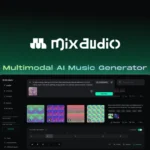Artificial intelligence continues to push boundaries across creative industries — and now, it’s rewriting the rules of music. According to Billboard, Xania Monet has become “the first known AI artist to achieve enough radio airplay to debut on a Billboard radio chart.”
Since her debut in the summer of 2025, Monet has entered several Billboard rankings, including Hot Gospel Songs with “Let Go, Let God” and Hot R&B Songs with “How Was I Supposed to Know.” Her growing popularity even led to a multimillion-dollar record deal with Hallwood Media after what Billboard described as “a bidding war” among labels eager to sign her.
A Virtual Artist with an R&B Soul
Xania Monet’s Apple Music profile describes her as “an AI figure in the highly expressive vein of contemporary R&B, rooted in the church and grounded in the emotional style of Keyshia Cole, K. Michelle, and Muni Long.”
Monet was created by Mississippi-born poet Telisha Nikki Jones, who writes all the lyrics performed by the virtual singer. To produce Monet’s music, Jones uses Suno, an AI-based song generator that turns lyrics into fully produced tracks.
In August 2025, Monet released her first full-length album, Unfolded, featuring 24 tracks. A month later, she followed up with a seven-song EP titled Pieces Left Behind. Together, these projects solidified her presence across digital platforms and radio airwaves — an achievement that few predicted possible for an AI musician just a few years ago.
A Divisive Moment for the Music Industry
Xania Monet’s rise has reignited the debate over artificial intelligence’s role in creative work. Both Hollywood and the music industry are watching closely as algorithm-driven productions gain ground against human artists.
Romel Murphy, who identifies as Monet’s manager, told CNN’s Victor Blackwell that the goal of the project is not to replace human creativity.
“AI doesn’t replace the artist. That’s not our objective at all,” Murphy said. “It doesn’t diminish creativity or take away from the human experience. It’s a new frontier — and like any change, some people are open to it while others are apprehensive.”
However, not everyone shares that optimism. R&B star Kehlani expressed frustration in a since-deleted TikTok video, saying, “An AI R&B artist just signed a multimillion-dollar record deal… and the person isn’t doing any of the work.” She added, “Nothing and no one on Earth could ever justify AI in music.”
The Rise of AI in Billboard Rankings
Billboard recently reported that “in the past few months alone, at least six AI or AI-assisted artists have debuted on various Billboard charts,” spanning genres such as gospel, rock, and country. The publication noted that it’s becoming “increasingly difficult to tell who — or what — is powered by AI, and to what extent.”
Many of these projects are created by anonymous individuals, signaling a growing and decentralized creative movement fueled by accessible generative tools.
Murphy compared the endurance of AI-generated music to the timeless catalogs of artists like Michael Jackson and Prince:
“Young people still listen to those songs even though the artists are no longer with us,” he said. “Music has to evolve. We just need to keep its integrity and authenticity — and bring it to the world.”




